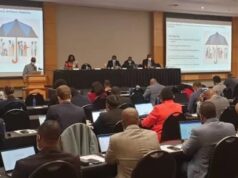
May 1-15, 2018
Oil rich countries of Africa face a strange paradox. Oil for them is a blessing as well as a curse. African oil economies have the capacity to meet the vast continent’s fuel requirements and create substantial exportable surpluses to aid the region’s development agenda. Africa’s crude oil production ofapproximately 7.9MMbpd, is double the requirement of the region. But the same resource also has destabilized many countries with high levels of corruption, insecurity and civil wars.
Further , instead of enriching the coffers with oil revenue,Africa’s under-performing refinery sector compels the oil producing countries in the region to sell the crude at throw away prices and buy the refined fuel from abroad at higher prices. This is a double whammy for Africa since it leads to considerable outflows of the foreign exchange and restrict value addition and employment generation in the hydrocarbon sector.
The under-performing refinery capacity, hovering at less than 2.1MMbpd, poses many valid questions. Africa’s oil producing countries are grappling with the question of whether to embark on upgrades of their existing refineries or to build additional facilities to meet demand. At present, Africa exports a significant amount of crude oil to countries in the Middle East and Europe. These refiners are more capable of processing the crude oil, at a cheaper cost, than African refineries. What holds back is the outmoded processes and technologies deployed. Despite these challenges, new refineries have been announced in countries such as Angola, Chad, Ivory Coast, Mozambique, Nigeria, South Africa, South Sudan and Uganda. Sadly, some of these projects do not go beyond mere announcements.
Africa’s oil demand is poised to increase from approximately 4.3 MMbpd in 2017 to nearly 5MMbpd in 2023. At the current rate of refining, the refined oil imports would scale up draining the continent’s foreign exchange reserves and more importantly, punching its economic expansion plans. Not many are coming forward as financial suitors for reasons, such as lack of political will to see through reforms in the hydrocarbon sector, poor infrastructure, which hinders distribution of refined oil across Africa to meet domestic demandetc. Lack of marine terminals and ships of adequate bottoms are major handicaps when it comes to oil exports.
The International Energy Agency (IEA) forecasts put that approximately 400 Mpbd of African refining capacity will be forced to close down by 2040 if additional investments are not made to upgrade the facilities. If investments come to fruition, the continent could see an increase in utilization rates, along with an additional 800 Mbpd of new capacity by 2040. This ambitious capacity expansion and upgrade program will entail approximately US$40 billion. An additional US$15 bn would be required for regular maintenance. The pertinent question is how such a huge quantum of resources can be mobilized from the cash starved countries in the region?
Editorial-Africa pulse 2018











